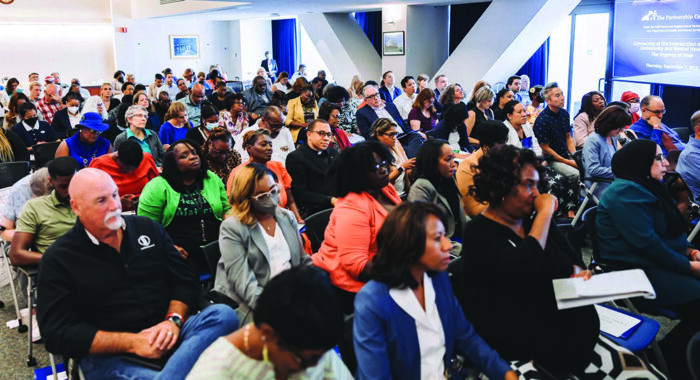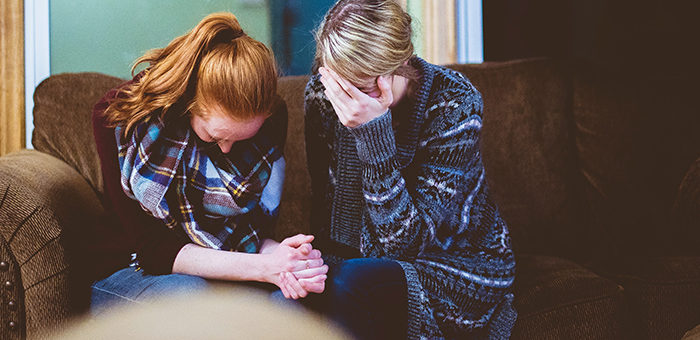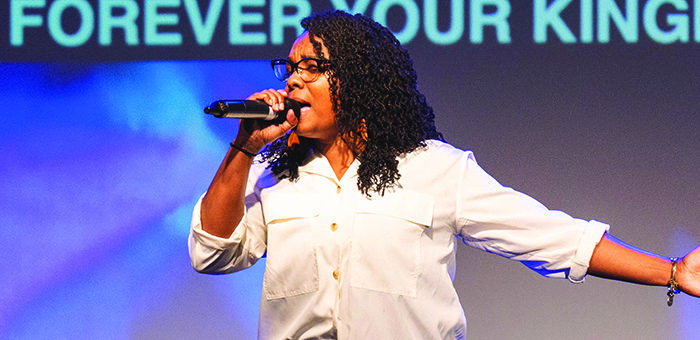We are living in times of trauma, surrounded by confusion, threats and unrest. The COVID-19 pandemic and outcries against racial injustice profoundly impact our world, our nation, our churches, our neighborhoods and our homes. It is disruptive and unsettling. And if we’re honest, we feel vulnerable. In fact, we are vulnerable.
But the threats are not merely external. We face internal threats as well. Many are anxious or depressed or grieving. Others are full of anger. There is no end in sight.
The pandemic has exposed and escalated other crises. Confronting death, living isolated lives, and experiencing continual fear have significantly increased the level of trauma. Depression, suicide, addictions and post-traumatic stress disorder have multiplied. Our mental health systems are not prepared for this onslaught. Economic losses will only exacerbate these problems. Even if the pandemic ends and a vaccine helps prevent its return, mental health crises will likely continue for years.
At the same time, we are seeing a rise in sexual abuse and domestic violence, abuse fueled by desire for power and control. As lives careen out of control, jobs are lost, isolation frustrates, rage deepens and violence in the home increases. Research has demonstrated that this abuse damages not only each occupant of a home, but destructively impacts future generations. Since child sexual abuse is most frequently reported by teachers and other professionals, quarantine results in a deadly combination of increased abuse and fewer reports.
Understanding Trauma
As our understanding of trauma has grown in recent years, we have come to realize that many people do not experience trauma as a one-time event, but live with relentless, ongoing trauma, literally marinating in evil. Ongoing sexual abuse of any kind traumatizes humans, shaping them in grievous ways. The stressors are repetitive and chronic, usually involving direct harm and/or neglect by those who should have been caregivers. Under these conditions, the workings of individuals’ brains and bodies, how they understand themselves and organize their thoughts, how they label the world, regulate their emotions, and conduct their relationships, become deeply rooted in the life-destroying acid of trauma.
As a result of chronic, interpersonal abuse, an individual develops vigilance, constantly anticipating danger, anxiety and terror. A person’s energy is all bent by necessity toward coping and surviving rather than toward flourishing. Evils of domestic violence, verbal battering and systemic racism all produce fear, hiding and self-protection. Traumatized people often experience betrayal by those who should be caring and nurturing. They are often unable to find assistance and safety.
In all the world the two safest places ought to be the church and the home. Statistics suggest otherwise. Today there are many people in our churches living in poor and dangerous neighborhoods, unemployed and now quarantined with violent and sexually abusive individuals. Many people in our churches who live in safe neighborhoods with plenty of money and good jobs are now quarantined with violent and sexually abusive family members. Trauma crosses all lines. It not only shapes victims but also teaches them lies about who they are and who God is.
Exposed by Crisis
In “Disciples Indeed,” Oswald Chambers said this: “Crisis reveals character. When we are put to the test the hidden resources of our character are revealed exactly.” We are now exposed. We have not confronted sexual abuse in homes and churches. We have minimized the evil of domestic violence and have sent victims home to live with ongoing abuse and cruelty — things that break our Father’s heart, things he hates. Instead of being a refuge for vulnerable sheep, we have often protected wolves. We have used, discarded and crushed precious people knit together by our God. We have marred our God’s exquisite artwork based on mere physical characteristics designed by him. We have denied dignity to image bearers. These crises expose our arrogance, our ungodly divisions, our self-protection and our failures to care for the least of these. The God of truth and light speaks through today’s difficult and frightening circumstances, inviting us to examine ourselves.
Toward a Christ-like Response
Our first response to this tsunami of crises needs to be humility, lament and repentance. If Jesus is truly our Lord, then the only right response to him is love and obedience. We ought to be on the frontlines for those hurting by the side of the road and those suffering in our churches. We need to acknowledge our failures in these areas. We have failed to follow our Lord who came to us, we who are the other side. We have failed to care for those suffering from abuse and racism. He is the God who crosses over. Our first response is to be on our faces before him, seeking his light and truth to illuminate where we have chosen our own comfort, positions and personal preferences rather than obedience to him.
Secondly, we need to listen and learn. Do you know what it is like to be terrified and abused in your own home? Or what it is like to be sexually abused or raped? Or to raise children who, because of the skin God gave them, are highly vulnerable to abuse, threats and death? Or to watch as the perpetrators of these ungodly and evil deeds are protected? Have you ever asked? Learn about the many ways your church could partner with local domestic violence shelters to provide resources for victims. Simply feeding and clothing an increasing number of victims and their children is an enormous task. Why not call and ask how your church might help? Ask about trainings they offer to ensure your help for victims is not harmful. Your church should know about hotlines you can call and disseminate that information. Learn about sexual abuse. There are men and women in your churches who have been abused — some within a church — and have never had anyone walk with them to help reverse the horror and damage of such abuse.
Non-Black pastors, connect with African American pastors in your area and learn from them. You want to know what it is like to live in their skin as our God lived in ours. We are fellow members of the family of God. How is it that the global world sees more clearly than his family the systemic racism we have created, denied and protected? Sit at the feet of those who are suffering and learn from them. Do not pass by. Go to the other side of the road and learn how to help.
Signs of the Word Made Flesh
Jesus demonstrated in the flesh what a human being bearing God’s image is to look like. “The Word became flesh and made his dwelling among us … full of grace and truth” (John 1:14). He crossed national, racial, gender and religious lines. He bent down, took on our skin, and became like us. He entered into our sufferings and deprivations and sorrows. He sat with the rejected, despised and abused. He was their refuge. He called leaders in the house of God to follow him, to look like him. Many refused. They preferred power and position and protected their many resources. Our God is calling to us in this whirlwind of troubles as well. Will we listen and follow?
The Word who became flesh said it is better to die than to hinder one who is little, vulnerable. He tells us that when we feed those who hunger (for safety as well as food), give water to the parched, embrace and include the stranger in our home, clothe the vulnerable, give care to the sick and to those in prison (or imprisoned by abuse or racism), we have done these things to him. What we do to the least, we do to the Highest.
Dear Church, as we follow Jesus in caring for the least of these, let us heed Aslan’s words to the children he sent on a rescue mission in C.S. Lewis’s “The Silver Chair:” “Remember the signs. Say them to yourself in the morning and … at night and … the middle of the night. … whatever strange things happen … let nothing turn your mind from following the signs.”
May the crises of our day reveal in us signs of the character of our Lord made flesh. May others witness the sign of our great love and humble service for the abused and for our neighbors. May we, like Christ, embody the great love of our great Father to a traumatized world.
This article originally appeared in Evangelicals magazine.
Recommended Resources from Diane Langberg
Books
- Suffering and the Heart of God: How Trauma Destroys and Christ Restores, Diane Langberg (New Growth Press, 2015)
- Counseling Survivors of Sexual Abuse, Diane Langberg (Xulon Press, 2003)
- On the Threshold of Hope: Opening the Door to Hope and Healing for Survivors of Sexual Abuse, Diane Langberg (Tyndale House Publishing, 1999)
- The Spiritual Impact of Sexual Abuse (minibook), Diane Langberg (New Growth Press, 2017)
- Naming Our Abuse: God’s Pathway to Healing for Male Sexual Abuse Survivors, Andrew Schmutzer (Kregel
Publications, 2016)
- Domestic Abuse: Recognize, Respond, Rescue, Darby Strickland (P&R Publishing, 2018)
- Unholy Charade: Unmasking the Domestic Abuser in the Church, Jeff Crippen (Justice Keepers Publishing, 2015)
- When Dad Hurts Mom: Helping Your Children Heal the Wounds of Abuse, Lundy Bancroft (Berkley, 2005)
- Color of Compromise, Jemar Tisby (Zondervan, 2019)
- Healing Racial Trauma, Sheila Wise Rowe (InterVarsity Press, 2020)
Documentary
Training
Websites
Diane Langberg, Ph.D., is a practicing psychologist working with trauma survivors, caregivers and clergy around the world. She directs a counseling practice in Pennsylvania, Diane Langberg, Ph.D. & Associates, which includes 15 therapists with multiple specialties. Langberg has authored several books including “Redeeming Power: Understanding Authority and Abuse in the Church.” She is co-leader of the Global Trauma Recovery Institute housed at Biblical Theological Seminary, board member of G.R.A.C.E. (Godly Response to Abuse in a Christian Environment), and co-chair for American Bible Society’s Trauma Advisory Council.




 View All Articles
View All Articles 











